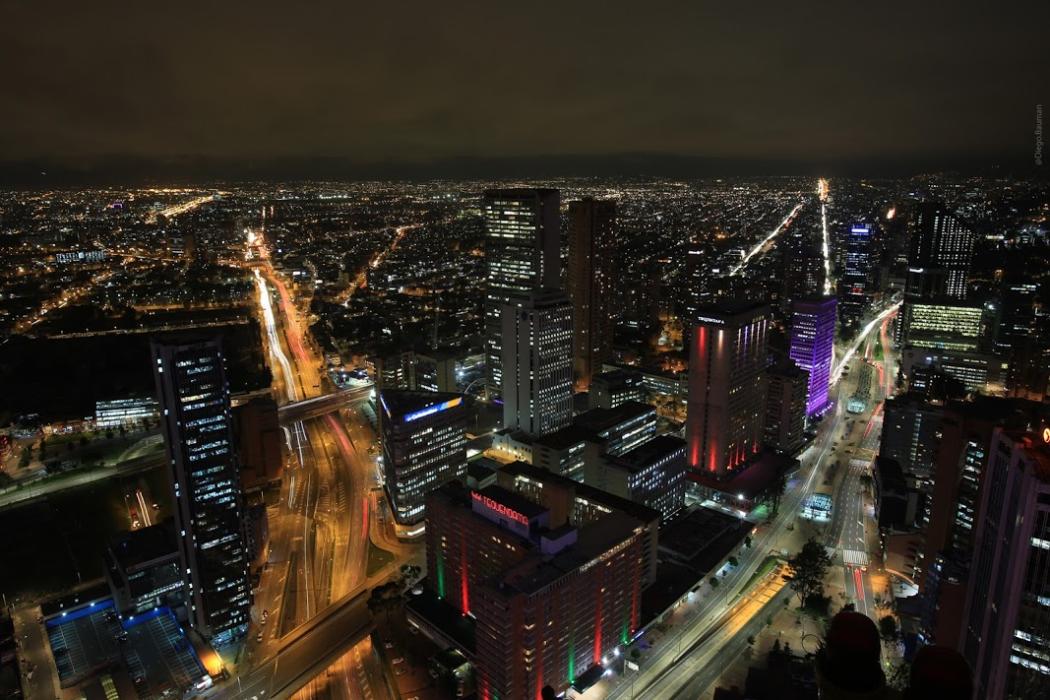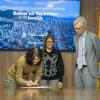The first recorded case of COVID-19 was announced on the 6th of march in Bogotá. This was also Colombia’s first reported case. On 12th March, the Mayor of Bogota issued a yellow alert in the city and several measures have been implemented to prevent and address the spread of COVID-19.
The Office of the Mayor of Bogotá has participated in more than 30 virtual meetings to share with other cities and countries of the world how the local administration is mitigating the effects of the virus and also addressing the social economic contingency. It has also learnt greatly from the experience and measures implemented in other cities.
These workshops have been organized by several city networks and international organizations such as UCLG, C40, CIDEU, Metropolis –AL-LAS, the Partnership for Healthy Cities by Bloomberg Philanthropists, UNESCO, the Central American Integration System and the United Nations Economic Commission for Latin America and the Caribbean (ECLAC).
Mayor Claudia Lopez has participated herself in dialogues with her peers from different cities of the world. The first took place on April 7th with the Mayors of Barcelona, Medellin and Montevideo and the second one on April 25th with the Mayors of Buenos Aires, Madrid, Lima, Montevideo and Santiago de Chile.
Here are some of the policy innovations announced over the past days:
Measures to strengthen the public health system
1. Open data for COVID 19 measurement model
Bogota is the first city in Colombia, and one of the first capital cities in the world, in making its data and epidemiological model of the pandemic curve public. "If we are going to make decisions that involve the life or death of the inhabitants of Bogotá, those decisions will be made based on the access to the same information," said Mayor Claudia Lopez.
The Secretary of Health of Bogota, with the support of epidemiological experts, developed a model that tracks the progression of the infection curve and its impact on the lives of citizens.
This information is real-time data and shows the following variables: the number of cases of contagion (by district, sex, age), cause of infection (imported, related or
under study), hospital capacity (ICU beds available), the type of care that each sick person is receiving (at home, hospitalization or in intensive care unit), their level of severity, and the number of recovered patients and fatalities, among others. Information is available in other realms such as daily percentage of occupation of the transport system. Lastly, citizens can check based on hypothetical modelled scenarios, the transmission dynamics of COVID-19 in the city.
This data can be consulted in: http://saludata.saludcapital.gov.co/osb/index.php/datos-de-salud/enfermedades-trasmisibles/covid1
2. Transitional hospital center in Corferias
The city's main convention and exhibition center was remodeled as a transitional hospital for patients of low complexity, with conditions unrelated to COVID-19. This measure seeks to decongest clinics and hospitals in the city, so the system infrastructure is concentrated in the care of critically ill COVID-19 patients. On 20th of April, the hospital began operations with 1,200 beds, with a potential capacity of up to 5,000 beds.
3. Acquisition of 200,000 diagnostic tests
The city acquired 200,000 diagnostic tests which increased the capacity for testing. The city had an initial capacity to perform 1,400 tests per day. Nowadays, the city is processing on average 2,500 tests per daily and delivering the results within 48 hours. The goals is to be able to reach the ability to process 3,000 tests daily.
The local government is committed to improving the quality and the accuracy of the data it collects in order to make better and more informed policy decisions.
Mobility and transport measures
In terms of mobility, the city is focusing most of its efforts in preventing crowding on public transport in order to mitigate the risk of infection in the mass transportation system, particularly after the partial reopening of the economy.
In consequence, TransMilenio (BRT system) will operate at 35% of its capacity. In order to guarantee operation at this capacity, from Monday 27 April 2020 onwards the system will operate with 100% of the fleet from Monday to Friday, 70% of the fleet on Saturdays and 50% of the fleet on Sundays.
Similarly, the city will make additional efforts to encourage the use of alternative transportation methods, including bicycle use and car-pooling.
In addition to the 500km (311 miles) of protected bicycle paths, the city has enabled 80 km (50 miles) of lanes of the main streets of the city for the exclusive and permanent use of bicycles (cycle path). This has led to an increase in bicycle use in most of the most important arteries in Bogotá. The goal is to double the use of the bicycle as a sustainable means of transportation, from 7% to 15% by the end of this administration.
Donaton
The Mayor of Bogotá, Claudia López, invited citizens, businesses, and international organizations to come together in a Donatón, an event to raise funds to address the needs derived from the COVID-19 pandemic. Donations will go to strengthen the health system of the city. Also, to help those most in need with groceries and cash transfers so that they can support themselves in what has been called, the “Quarantine for Life”.
On Sunday 19th April more than 45.000 citizens, and over 150 businesses, business associations, international organizations, and artists came together to support this initiative, raising more than $ 51,696 million Colombian pesos (USD 13 million) in money and in kind during 12 hours of uninterrupted donations. This is an unprecedented act of collective action in the history of Bogotá and Colombia.
Most of the donations where in kind: ventilators, hospital equipment, personal protective equipment and groceries for poor and vulnerable families. Also, beds and infrastructure for the reconversion process of Corferias, Bogota’s main convention and exhibition center, which has been reconverted into a temporary hospital for patients with conditions other that those linked to COVID-19.
“From this challenge that life has thrown at us, not the richest or strongest will come out, but the most supportive and disciplined. Bogotá has demonstrated today that we can both, set an example and inspire pride!”, the mayor stated during the event, praising the qualities that bogotanos have shown since the beginning of the Covid-19 pandemic.
The raised amount will also help to support more than 500,000 families in need from poor and vulnerable backgrounds in the city that require a daily basic sustenance to get through quarantine at home, as part of the Bogotá Home Solidarity campaign (Campaña de Bogotá Solidaria en Casa.)






